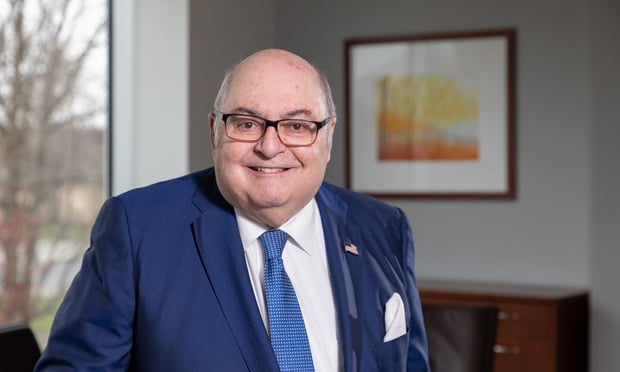Stephen Orlofsky's Advocacy Averts 'Horrible Precedent for Municipalities' in 2018
"I said, 'look, there are no guarantees,'" Orlofsky, a well-known litigator and former federal judge, recalled telling the client. "When they [the Supreme Court] took it, I knew I had a shot."
June 07, 2019 at 03:00 PM
5 minute read
 Stephen Orlofsky of Blank Rome – Photo by Carmen Natale/ALM
Stephen Orlofsky of Blank Rome – Photo by Carmen Natale/ALM
For Stephen Orlofksy, the call to come into a case on a motion for leave to appeal to the New Jersey Supreme Court isn't an uncommon one. But in representing the City of Paterson in Lee v. Brown, he recognized the importance in addressing what he called “a horrible precedent for municipalities in this state.”
“I said, 'look, there are no guarantees,'” Orlofsky, a well-known litigator in New Jersey and former federal judge, recalled telling the client. “When they [the Supreme Court] took it, I knew I had a shot.”
Below, a trial court and the Appellate Division had ruled that the city's fire inspector should be awarded qualified immunity only, which meant the city could have been held at least partially liable in lawsuits filed over a June 30, 2010, apartment building fire that killed four people and injured numerous others. The plaintiffs claimed that the city fire inspector discovered numerous wiring issues at the building but failed to properly prosecute its owner. The high court granted a motion for leave to appeal.
Coming into a case late is “an anxiety-producing situation, because you're playing catch-up,” Orlofsky said—with a lot of material to review, complex issues to address, and limited time to accomplish all of that.
The case would turn on an interpretation of the state Supreme Court's 1991 ruling in Bombace v. Newark, which held: “A public employee is not liable for an injury caused by his adoption of or failure to adopt any law or by his failure to enforce any law.”
The Bombace case draws a distinction between a “non-action” and an action leading to an event, Orlofsky noted. Whereas the City of Newark in Bombace had taken the action of withdrawing its complaint charging a building owner with a fire code violation, Paterson had not prosecuted following the inspection at issue in the Lee case. The city did threaten Brown with fines and directed her to hire an electrician to fix the wiring problems, which she didn't do, according to the suit.
The September 2017 argument was a “pretty spirited argument” in the case, which involved seven plaintiffs attorneys and one amicus, the New Jersey Association for Justice, opposing the city, Orlofsky said.
“The court immediately seized on the fact that this case turned on Bombace,” Orlofsky recalled. “Sometimes you can't tell anything, but I could tell they were following our argument.”
The court, led by Justice Faustino Fernandez-Vina, reversed in a February 2018 ruling. The Tort Claims Act “grants absolute immunity from liability to public entities and their employees for injuries resulting from a failure to enforce the law,” Fernandez-Vina wrote.
“The critical causative conduct in this case was [the] failure to contact [superiors] and secure an emergency power shut-off or to seek relief in court, not any affirmative action to enforce the law,” he said, adding that the “prior conduct of inspecting and issuing notices of violation is not sufficient to subject [the inspector] to liability.”
“If they had affirmed this … the city would've had to defend on the basis that they acted in good faith, and that would be a jury question,” Orlofsky said, contending that “endless” litigation would ensue if government entities could be held civilly liable for failure to enforce laws. One hypothetical suit he presented could be based on a police department's failure to issue a speeding citation to a driver who ultimately causes a crash.
Asked if the Lee case was particularly weighty given the consequences for New Jersey taxpayers, Orlofsky responded, “All my clients' cases weigh on me.” He did note that he also represented Jersey City in Wilson v. Jersey City, which in 2012 led to a Supreme Court ruling that two 9-1-1 operators were statutorily immune from negligence claims for mishandling calls about a fatal stabbing.
Orlofsky estimated going before the New Jersey Supreme Court seven or eight times since retiring from the bench. Orlofsky served in the U.S. Army from 1966 to 1970 and, after attending law school, was a U.S. magistrate judge in New Jersey from 1976 to 1980. Later he was nominated as a district judge by President Bill Clinton and sworn-in in late 1995. In between, Orlofsky was an associate, then partner, at Blank Rome in New Jersey. He returned to Blank Rome after his 2003 retirement from the bench.
It's not lost on Orlofsky that the Lee ruling has a tangible effect on the plaintiffs, but, he said, the consequences would have been far broader if the court decided differently.
“It's tragic that they [the plaintiffs] don't have a deep pocket to recover from. But at the same time, if [the court] had gone the other way, it would've been a horrible precedent for municipalities in this state,” he said.
This content has been archived. It is available through our partners, LexisNexis® and Bloomberg Law.
To view this content, please continue to their sites.
Not a Lexis Subscriber?
Subscribe Now
Not a Bloomberg Law Subscriber?
Subscribe Now
NOT FOR REPRINT
© 2025 ALM Global, LLC, All Rights Reserved. Request academic re-use from www.copyright.com. All other uses, submit a request to [email protected]. For more information visit Asset & Logo Licensing.
You Might Like
View All
Neighboring States Have Either Passed or Proposed Climate Superfund Laws—Is Pennsylvania Next?
7 minute read
An Overview of Proposed Changes to the Federal Rules of Procedure Relating to the Expansion of Remote Trial Testimony
15 minute readTrending Stories
- 1Starbucks Sues Ex-Executive to Recover $1M Signing Bonus
- 2Navigating AI Risks: Best Practices for Compliance and Security
- 320 New Judges? Connecticut Could Get Wave of Jurists
- 4Orrick Loses 10-Lawyer Team to Herbert Smith in Germany
- 5‘The US Market Is Critical’: KPMG’s Former Head of Global Legal Services On the Legal Arm of the Big Four Firm Entering the US
Who Got The Work
J. Brugh Lower of Gibbons has entered an appearance for industrial equipment supplier Devco Corporation in a pending trademark infringement lawsuit. The suit, accusing the defendant of selling knock-off Graco products, was filed Dec. 18 in New Jersey District Court by Rivkin Radler on behalf of Graco Inc. and Graco Minnesota. The case, assigned to U.S. District Judge Zahid N. Quraishi, is 3:24-cv-11294, Graco Inc. et al v. Devco Corporation.
Who Got The Work
Rebecca Maller-Stein and Kent A. Yalowitz of Arnold & Porter Kaye Scholer have entered their appearances for Hanaco Venture Capital and its executives, Lior Prosor and David Frankel, in a pending securities lawsuit. The action, filed on Dec. 24 in New York Southern District Court by Zell, Aron & Co. on behalf of Goldeneye Advisors, accuses the defendants of negligently and fraudulently managing the plaintiff's $1 million investment. The case, assigned to U.S. District Judge Vernon S. Broderick, is 1:24-cv-09918, Goldeneye Advisors, LLC v. Hanaco Venture Capital, Ltd. et al.
Who Got The Work
Attorneys from A&O Shearman has stepped in as defense counsel for Toronto-Dominion Bank and other defendants in a pending securities class action. The suit, filed Dec. 11 in New York Southern District Court by Bleichmar Fonti & Auld, accuses the defendants of concealing the bank's 'pervasive' deficiencies in regards to its compliance with the Bank Secrecy Act and the quality of its anti-money laundering controls. The case, assigned to U.S. District Judge Arun Subramanian, is 1:24-cv-09445, Gonzalez v. The Toronto-Dominion Bank et al.
Who Got The Work
Crown Castle International, a Pennsylvania company providing shared communications infrastructure, has turned to Luke D. Wolf of Gordon Rees Scully Mansukhani to fend off a pending breach-of-contract lawsuit. The court action, filed Nov. 25 in Michigan Eastern District Court by Hooper Hathaway PC on behalf of The Town Residences LLC, accuses Crown Castle of failing to transfer approximately $30,000 in utility payments from T-Mobile in breach of a roof-top lease and assignment agreement. The case, assigned to U.S. District Judge Susan K. Declercq, is 2:24-cv-13131, The Town Residences LLC v. T-Mobile US, Inc. et al.
Who Got The Work
Wilfred P. Coronato and Daniel M. Schwartz of McCarter & English have stepped in as defense counsel to Electrolux Home Products Inc. in a pending product liability lawsuit. The court action, filed Nov. 26 in New York Eastern District Court by Poulos Lopiccolo PC and Nagel Rice LLP on behalf of David Stern, alleges that the defendant's refrigerators’ drawers and shelving repeatedly break and fall apart within months after purchase. The case, assigned to U.S. District Judge Joan M. Azrack, is 2:24-cv-08204, Stern v. Electrolux Home Products, Inc.
Featured Firms
Law Offices of Gary Martin Hays & Associates, P.C.
(470) 294-1674
Law Offices of Mark E. Salomone
(857) 444-6468
Smith & Hassler
(713) 739-1250








